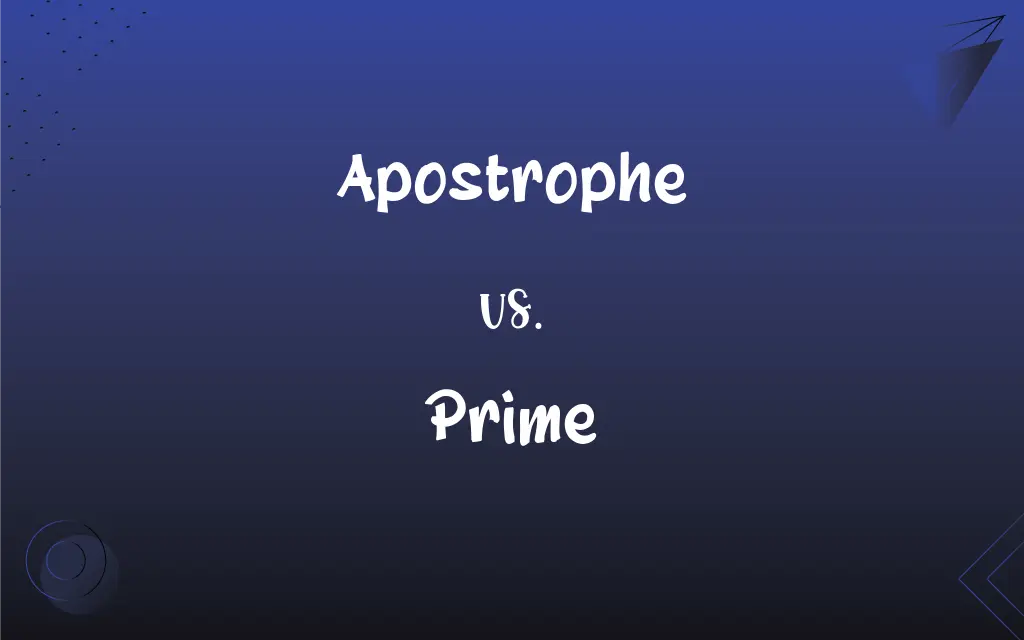Apostrophe vs. Prime: What's the Difference?
By Harlon Moss & Aimie Carlson || Updated on May 20, 2024
An apostrophe (’) is used to indicate possession or contractions, while a prime (′) is used to denote feet, minutes, or differentiate between similar items in a series.

Key Differences
An apostrophe is a punctuation mark primarily used in English to indicate possession or the omission of letters in contractions. For instance, in "John's book," the apostrophe shows that the book belongs to John, and in "can't," it signifies the missing letters from "cannot." A prime, on the other hand, is a mathematical symbol that resembles an apostrophe but has distinct uses. It is commonly used to denote feet in measurements, such as 5′ 8″ for five feet eight inches, or to represent minutes in time and angles, as in 45′ for forty-five minutes.
In text formatting, apostrophes are often curved or typographic (’), which differentiates them visually from primes, which are straight (′). This distinction is important in written contexts to avoid confusion between the two symbols.
While apostrophes are central to grammatical constructions in English, primes are more relevant in mathematical and scientific contexts. For instance, primes are used in notation for derivatives in calculus, like f′(x), indicating the first derivative of the function f.
Apostrophes also appear in possessive pronouns, like "one’s" or "someone’s," whereas primes do not have a role in such grammatical constructs. The apostrophe’s role is tied to language rules, whereas the prime’s use is often technical or numerical.
Both symbols may appear similar, their uses are distinct and context-specific: the apostrophe for language and grammar, and the prime for measurements, mathematics, and notation.
ADVERTISEMENT
Comparison Chart
Primary Use
Possession, contractions
Feet, minutes, differentiation
Appearance
Curved or typographic (’)
Straight (′)
Context
Language and grammar
Mathematical, scientific notation
Example Usage
"John's book" (possession)
6′ 5″ (height measurement)
Grammatical Role
Possessive pronouns, contractions
Not applicable
ADVERTISEMENT
Apostrophe and Prime Definitions
Apostrophe
Shows where letters are omitted in informal speech.
It’s a beautiful day.
Prime
First or highest in rank or importance; main
Our prime consideration is for the children's safety. See Usage Note at perfect.
Apostrophe
Indicates ownership.
Mary’s car is parked outside.
Prime
Highest in quality; excellent
Prime real estate.
Apostrophe
Used in plurals of lowercase letters.
Mind your p’s and q’s.
Prime
Being the most desired or suitable example of something
A prime candidate for the study.
Apostrophe
Shortens words by omitting letters.
Don’t forget to lock the door.
Prime
Of or relating to the USDA highest grade of beef, having abundant marbling and usually only sold at restaurants.
Apostrophe
Used with possessive pronouns.
One’s own choices define their path.
Prime
First or early in time, order, or sequence
The prime action of the drug.
Apostrophe
The superscript sign ( ' ), usually used to indicate the omission of a letter or letters from a word, the possessive case, or the plurals of numbers, letters, and abbreviations.
Prime
(Mathematics) Of, relating to, or being a prime number.
Apostrophe
The direct address of an absent or imaginary person or of a personified abstraction, especially as a digression in the course of a speech or composition.
Prime
The period of greatest physical and mental robustness
Athletes in the prime of their lives.
Apostrophe
(orthography) The text character ’, which serves as a punctuation mark in various languages and as a diacritical mark in certain rare contexts.
Prime
The period of best performance or peak activity
This car is definitely past its prime.
Apostrophe
(rhetoric) A sudden exclamatory piece of dialogue addressed to someone or something, especially absent.
Prime
To make ready; prepare
Guard dogs primed for attack.
Apostrophe
A figure of speech by which the orator or writer suddenly breaks off from the previous method of his discourse, and addresses, in the second person, some person or thing, absent or present; as, Milton's apostrophe to Light at the beginning of the third book of "Paradise Lost."
Prime
To prepare (a gun or mine) for firing by inserting a charge of gunpowder or a primer.
Apostrophe
The contraction of a word by the omission of a letter or letters, which omission is marked by the character ['] placed where the letter or letters would have been; as, call'd for called.
Prime
To prepare for operation, as by pouring water into a pump or gasoline into a carburetor.
Apostrophe
The mark ['] used to denote that a word is contracted (as in ne'er for never, can't for can not), and as a sign of the possessive, singular and plural; as, a boy's hat, boys' hats. In the latter use it originally marked the omission of the letter e.
Prime
To prepare (a surface) for painting by covering with size, primer, or an undercoat.
Apostrophe
Address to an absent or imaginary person
Prime
To inform or instruct beforehand; coach.
Apostrophe
The mark (') used to indicate the omission of one or more letters from a printed word
Prime
To become prepared for future action or operation.
Prime
First in importance, degree, or rank.
Our prime concern here is to keep the community safe.
Prime
First in time, order, or sequence.
Both the English and French governments established prime meridians in their capitals.
Prime
First in excellence, quality, or value.
This is a prime location for a bookstore.
Prime
Having exactly two integral factors: itself and unity (1 in the case of integers).
Thirteen is a prime number.
Prime
Such that if it divides a product, it divides one of the multiplicands.
Prime
(mathematics) Having its complement closed under multiplication: said only of ideals.
Prime
Marked or distinguished by the prime symbol.
Prime
Early; blooming; being in the first stage.
Prime
(obsolete) Lecherous, lewd, lustful.
Prime
(historical) The first hour of daylight; the first canonical hour.
Prime
(Christianity) The religious service appointed to this hour.
Prime
(obsolete) The early morning generally.
Prime
The earliest stage of something.
Prime
The most active, thriving, or successful stage or period.
Prime
The chief or best individual or part.
Prime
(music) The first note or tone of a musical scale.
Prime
(fencing) The first defensive position, with the sword hand held at head height, and the tip of the sword at head height.
Prime
A prime element of a mathematical structure, particularly a prime number.
3 is a prime.
Prime
(card games) A four-card hand containing one card of each suit in the game of primero; the opposite of a flush in poker.
Prime
(backgammon) Six consecutive blocks, which prevent the opponent's pieces from passing.
I'm threatening to build a prime here.
Prime
The symbol ′ used to indicate feet, minutes, derivation and other measures and mathematical operations.
Prime
Any number expressing the combining weight or equivalent of any particular element; so called because these numbers were respectively reduced to their lowest relative terms on the fixed standard of hydrogen as 1.
Prime
An inch, as composed of twelve seconds in the duodecimal system.
Prime
(obsolete) The priming in a flintlock.
Prime
A feather, from the wing of the cock ostrich, that is of the palest possible shade.
Prime
(cycling) An intermediate sprint within a race, usually offering a prize and/or points.
Prime
(transitive) To prepare a mechanism for its main work.
You'll have to press this button twice to prime the fuel pump.
Prime
(transitive) To apply a coat of primer paint to.
I need to prime these handrails before we can apply the finish coat.
Prime
To be renewed.
Prime
(intransitive) To serve as priming for the charge of a gun.
Prime
To work so that foaming occurs from too violent ebullition, which causes water to become mixed with, and be carried along with, the steam that is formed.
Prime
To apply priming to (a musket or cannon); to apply a primer to (a metallic cartridge).
Prime
To prepare; to make ready; to instruct beforehand; to coach.
To prime a witness
The boys are primed for mischief.
Prime
To trim or prune.
To prime trees
Prime
(math) To mark with a prime mark.
Prime
First in order of time; original; primeval; primitive; primary.
She was not the prime cause, but I myself.
Prime
First in rank, degree, dignity, authority, or importance; as, prime minister.
Prime
First in excellence; of highest quality; as, prime wheat; a prime quality of cloth.
Prime
Early; blooming; being in the first stage.
His starry helm, unbuckled, showed him primeIn manhood where youth ended.
Prime
Lecherous; lustful; lewd.
Prime
Marked or distinguished by a mark (´) called a prime mark.
Prime
Divisible by no number except itself or unity; as, 7 is a prime number.
Prime
The first part; the earliest stage; the beginning or opening, as of the day, the year, etc.; hence, the dawn; the spring.
In the very prime of the world.
Hope waits upon the flowery prime.
Prime
The spring of life; youth; hence, full health, strength, or beauty; perfection.
Prime
That which is first in quantity; the most excellent portion; the best part.
Give him always of the prime.
Prime
The morning; specifically (R. C. Ch.), the first canonical hour, succeeding to lauds.
Early and late it rung, at evening and at prime.
They sleep till that it was pryme large.
Prime
The first of the chief guards.
Prime
Any number expressing the combining weight or equivalent of any particular element; - so called because these numbers were respectively reduced to their lowest relative terms on the fixed standard of hydrogen as 1.
Prime
To apply priming to, as a musket or a cannon; to apply a primer to, as a metallic cartridge.
Prime
To lay the first color, coating, or preparation upon (a surface), as in painting; as, to prime a canvas, a wall.
Prime
To prepare; to make ready; to instruct beforehand; to post; to coach; as, to prime a witness; the boys are primed for mischief.
Prime
To trim or prune, as trees.
Prime
To mark with a prime mark.
Prime
To be renewed, or as at first.
Night's bashful empress, though she often wane,As oft repeats her darkness, primes again.
Prime
To serve as priming for the charge of a gun.
Prime
To work so that foaming occurs from too violent ebullition, which causes water to become mixed with, and be carried along with, the steam that is formed; - said of a steam boiler.
Prime
A number that has no factor but itself and 1
Prime
The period of greatest prosperity or productivity
Prime
The second canonical hour; about 6 a.m.
Prime
The time of maturity when power and vigor are greatest
Prime
Insert a primer into (a gun, mine, charge, etc.) preparatory to detonation or firing;
Prime a cannon
Prime a mine
Prime
Cover with a primer; apply a primer to
Prime
Fill with priming liquid;
Prime a car engine
Prime
First in rank or degree;
An architect of premier rank
The prime minister
Prime
Used of the first or originating agent;
Prime mover
Prime
Of superior grade;
Choice wines
Prime beef
Prize carnations
Quality paper
Select peaches
Prime
Of or relating to or being an integer that cannot be factored into other integers;
Prime number
Prime
At the best stage;
Our manhood's prime vigor
Prime
Indicates feet in height or length.
He is 6′ tall.
Prime
Represents minutes in time or angles.
The meeting starts in 30′.
Prime
Used in calculus for derivatives.
The function’s first derivative is f′(x).
Prime
Distinguishes similar items or variables.
X′ and x″ are two different values.
Prime
Denotes prime numbers in lists or sequences.
The prime number sequence is 2′, 3′, 5′, 7′.
FAQs
Where do we use primes in mathematics?
Primes are used in calculus to denote derivatives, such as f′(x).
What does an apostrophe look like?
An apostrophe is curved or typographic (’), differentiating it from a straight prime (′).
Do apostrophes appear in possessive pronouns?
Yes, apostrophes are used with possessive pronouns like "one’s" and "someone’s."
What symbol represents feet in height?
The prime symbol (′) represents feet in height measurements.
Can an apostrophe and a prime be used interchangeably?
No, an apostrophe and a prime serve different purposes and contexts.
How are primes used in time notation?
Primes represent minutes in time, like 45′ for forty-five minutes.
How is a prime symbol used in measurements?
A prime symbol denotes feet in height or length, like 6′ 2″.
What is the main use of an apostrophe?
An apostrophe is mainly used to indicate possession or contractions in English.
How is a prime symbol written?
A prime symbol is straight (′), unlike the curved apostrophe (’).
Are primes used in written English sentences?
Primes are not typically used in general written English but in specific contexts like measurements and mathematics.
What are apostrophes and primes often confused for?
Apostrophes and primes are often confused due to their visual similarity but serve different functions.
Is the prime symbol used in technical fields?
Yes, it’s widely used in technical fields for measurements and notations.
Can primes denote angles?
Yes, primes denote minutes of arc in angles, like 30′.
What role do apostrophes play in contractions?
Apostrophes replace omitted letters, as in "can’t" for "cannot."
Is a prime used to distinguish similar items?
Yes, primes can distinguish between similar variables or items, such as x′ and x″.
What punctuation is used in possessive forms?
An apostrophe is used in possessive forms, e.g., "Jane’s book."
How do you indicate possession in English?
By using an apostrophe, such as in "the dog’s bone."
What punctuation mark shows omitted letters?
The apostrophe shows omitted letters in contractions.
Do apostrophes appear in informal speech?
Yes, apostrophes indicate omissions in informal speech, like "it’s" for "it is."
What contexts use primes outside of mathematics?
Primes are used in measurements, time, and technical notations outside of mathematics.
About Author
Written by
Harlon MossHarlon is a seasoned quality moderator and accomplished content writer for Difference Wiki. An alumnus of the prestigious University of California, he earned his degree in Computer Science. Leveraging his academic background, Harlon brings a meticulous and informed perspective to his work, ensuring content accuracy and excellence.
Co-written by
Aimie CarlsonAimie Carlson, holding a master's degree in English literature, is a fervent English language enthusiast. She lends her writing talents to Difference Wiki, a prominent website that specializes in comparisons, offering readers insightful analyses that both captivate and inform.































































